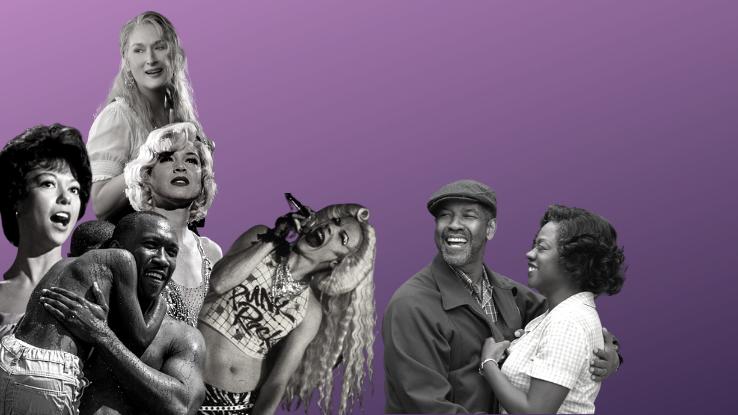
Whether you’re a passionate fan of plays and musicals, an opera lover, or a more casual attendee, it’s clear that there’s nothing quite like a live performance — the feeling of actors, dancers, musicians and other artists performing right in front of your eyes in a communal space. However, there are many outstanding stage-to-film adaptations that bring the magic of live theater into your living room. We’ve rounded up 15 of the best stage-to-film adaptations to celebrate World Theater Day.
Hamlet (1996)
Transferring a play that’s as iconic as William Shakespeare‘s Hamlet to the screen is no easy task, but Kenneth Branagh managed to pull it off rather well back in 1996. Branagh both directed and starred in the four-hour long film adaptation, which was among the first to ever utilize the play’s full, unabridged text.
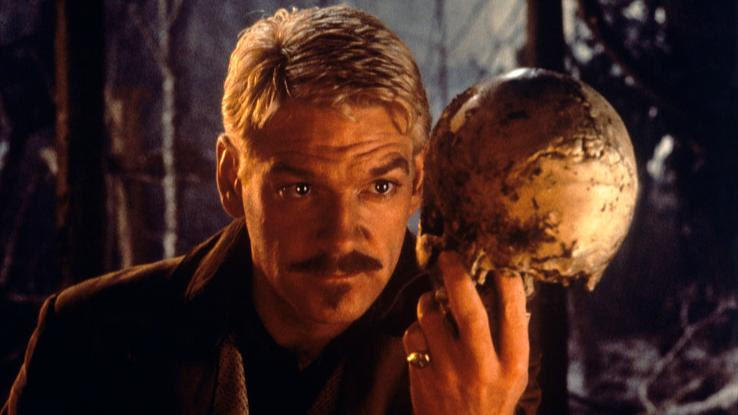
Although Branagh’s Hamlet was updated to take place in the 19th century, the four-time Oscar nominated film otherwise stays true to the enduring story of Denmark’s brooding prince. Other greats, such as Kate Winslet, Julie Christie, Judi Dench and Robin Williams, fill out the ensemble.
Moonlight (2016)
Written and directed by Barry Jenkins, the coming-of-age drama Moonlight is based on Tarell Alvin McCraney’s unpublished play In Moonlight Black Boys Look Blue. Taking from its stage roots, Jenkins’ film is told in three parts, each representing a different stage in the main character Chiron’s (Trevante Rhodes, Ashton Sanders and Alex Hibbert) life and explores his struggles with sexuality, identity and past abuse.
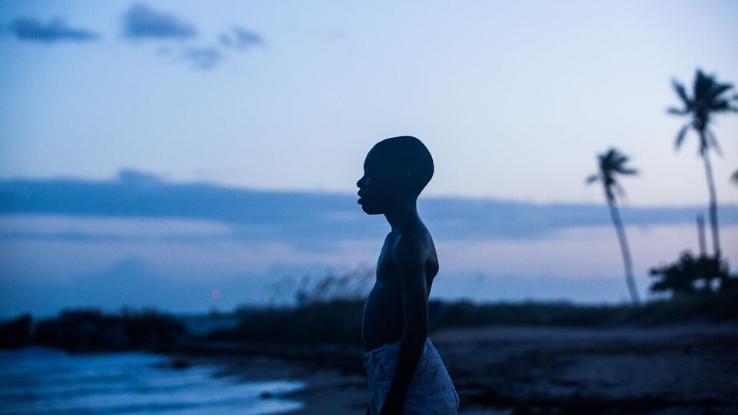
Often, Moonlight is heralded as one of the best films of the 21st century. The film won top prizes at both the Golden Globes and the Oscars and nabbed additional Oscars for Best Adapted Screenplay and Best Supporting Actor for Mahershala Ali, who plays Chiron’s father figure. By exploring the intersections of masculinity, queerness and Blackness, Moonlight, as the Los Angeles Times’ Justin Chang puts it, is both “achingly romantic and uncommonly wise.”
Once (2007)
In 2008, an indie Irish musical made a mark on the Oscars by nabbing the Academy Award for Best Song. Now, Once (2007) feels like a classic — in both its film and stage formats. The film stars singer/songwriter Glen Hansard and Markéta Irglová, who play struggling musicians in Dublin.
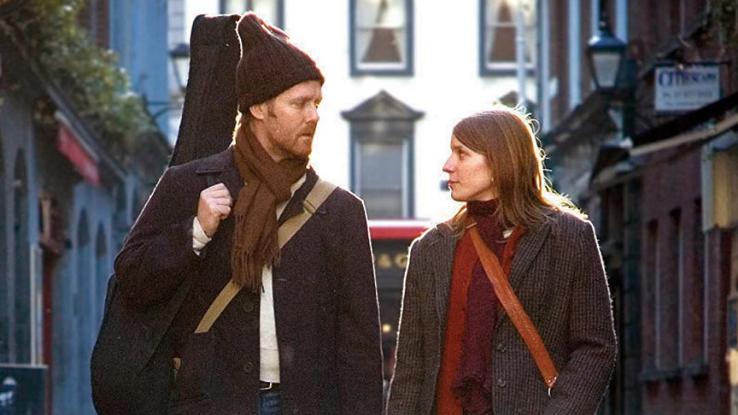
Hansard’s 30-something busker plays guitar by night, but fixes vacuums by day, all of which leads him to meet Irglová’s character. Eventually, he teaches her one of his songs, the Oscar-winning “Falling Slowly” — and, let’s just say, this raw, wrenching film will leave you with a few tears in your eyes by the end.
Fences (2016)
American playwright August Wilson has been referred to as the “theater’s poet of Black America,” having penned classics such as Ma Rainey’s Black Bottom (1984), Fences (1984), The Piano Lesson (1987). While the latter two plays both received the Pulitzer Prize for Drama, Fences also earned a Tony Award for Best Play.
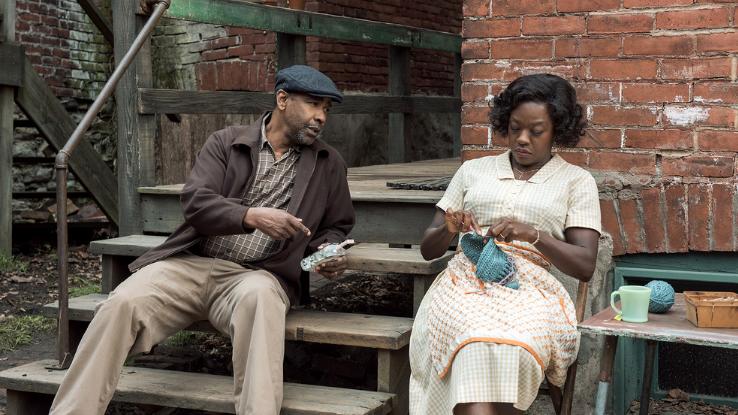
If you missed Fences on stage, you can still watch the critically acclaimed film adaptation, which stars Academy Award winners Denzel Washington and Viola Davis. Set in 1950s Pittsburgh, the film (and play) centers on Troy Maxson (Washington), a sanitation worker who dreamed of becoming a professional baseball player, only to be called too old when Major League Baseball (MLB) began admitting Black athletes. Troy carries this frustration with him for years — and we see the way that impacts not just him, but his son as well.
The four-time Oscar nominated film truly stands out as a great stage-to-screen adaptation. And, if you want to see another August Wilson play on the screen, check out Davis’ incredible performance in the recent adaptation of Ma Rainey’s Black Bottom (2020), which also stars the late Chadwick Boseman.
Hedwig and the Angry Inch (2001)
Based on John Cameron Mitchell and Stephen Trask’s 1998 musical Hedwig and the Angry Inch, Mitchell adapted, directed and starred in this beloved film version. The story centers on Hedwig Robinson, a genderqueer East German rock singer who develops a relationship with Tommy, a musical collaborator and mentor. Tommy ends up stealing Hedwig’s music — and becomes a bonafide rockstar, while Hedwig, and backing band the Angry Inch, shadow Tommy’s tour.
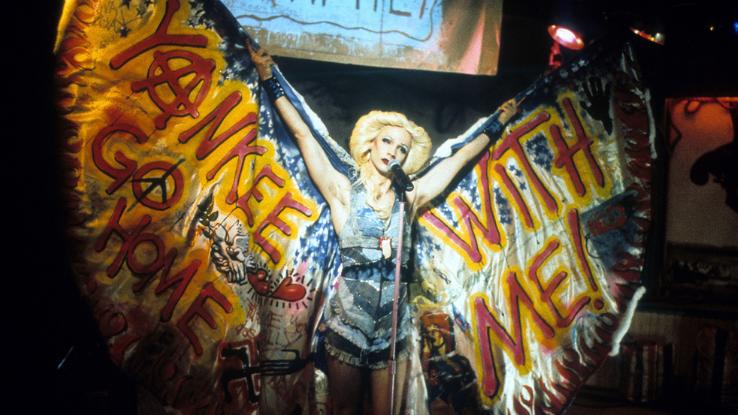
Part rock show, part exploration of Hedwig’s past and complex gender identity, the film succeeds because Mitchell is such a powerhouse. His work in Hedwig defines what it means to give a Performance, capital “P.” The show’s most well-known song, “The Origin of Love,” retells a myth mentioned in Plato’s Symposium, about two-face and four-armed and -legged humans being cleft in two by angry gods — only to yearn and search for their other halves. That sort of raw, unrestrained and fundamental searching undergirds Hedwig’s experiences with love and self.
Who’s Afraid Of Virginia Woolf? (1966)
Written by three-time Pulitzer Prize-winner and two-time Tony-winner Edward Albee, Who’s Afraid Of Virginia Woolf? was first staged in 1962. Told in three acts, it’s a whopping three hours long on stage, which is, well, kind of a lot. Perhaps surprisingly, though, audiences flocked to the stage to see it.
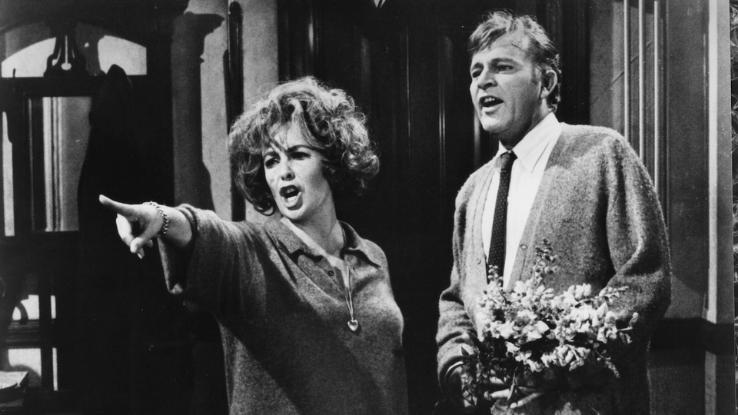
A few years later, the Tony-winning play was adapted into a film starring Richard Burton, Elizabeth Taylor, George Segal and Sandy Dennis. In both versions, a middle-aged couple George (Burton) and Martha (Taylor) draw a younger couple, Nick and Honey (Segal, Dennis), into their bitter, argument-riddled dynamic. Nominated for 13 Oscars — and winning five, including Best Actress — Who’s Afraid Of Virginia Woolf? was groundbreaking at the time with its profanity, dark humor and incisive look at marriage.
Chicago (2002)
The 2002 film adaptation of the 1975 musical Chicago is one of those movies you’ll love even if you aren’t usually into musicals. It’s bold and big — and, for many, the movie is actually the definitive version.
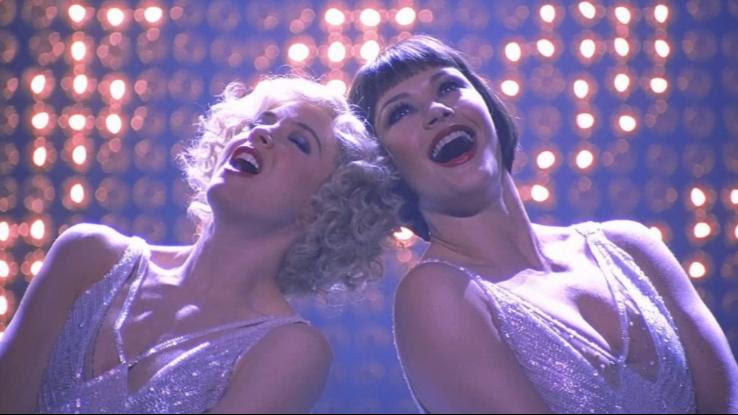
The story follows the tale of two women murderers who find themselves on death in 1920s Chicago. The two develop a rivalry as they compete for the fame they hope will save them from the gallows. A mixture of dark comedy, killer music, and incredible dancing, Chicago stars Catherine Zeta-Jones, Renee Zellweger, and Richard Gere. The film swept the 2003 Academy Awards, scoring six Oscars, including Best Picture — and, if you tune in, you’ll see why. It really is all that jazz.
Pass Over (2018)
Playwright Antoinette Chinonye Nwandu struck gold when she wrote Pass Over, a play inspired by Samuel Beckett’s Waiting for Godot. The story revolves around a pair of young Black men as they pass the day on a street corner, hoping that maybe today will be different than all the rest.

In 2018, Spike Lee turned the play into an equally striking movie starring Jon Michael Hill and Julian Parker. What we love most about this adaptation of Pass Over is how it brings that sense of the stage to your TV; yes, it is a filmed play, but it pulls off the beats of theater surprisingly well — and that isn’t easy to translate. Deeply thoughtful and timely, Lee’s adaptation captures everything from the poetry to humor to the urgency of Nwandu’s original work.
Doubt (2008)
The 2008 film adaptation of Doubt is based on John Patrick Shanley’s Pulitzer Prize- and Tony Award-winning play of the same name. The story takes place at a Catholic school in 1964; Donald Miller, the school’s first Black student, has just been admitted, perhaps due in part to Father Flynn’s (Phillip Seymour Hoffman) enthusiasm for creating a more inclusive school.
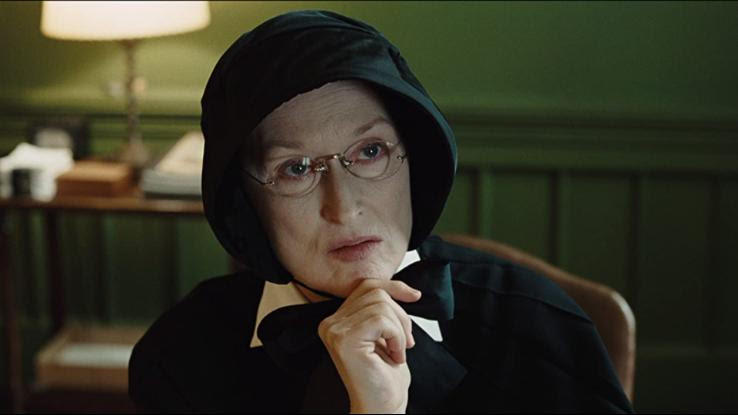
However, Sister Aloysius (Meryl Streep) isn’t too keen on change. When a younger nun (Amy Adams) shares her suspicions that Father Flynn is abusing Donald, Sister Aloysius seizes the opportunity to expose Father Flynn and expel him from the school. However, Sister Aloysius doesn’t have a lot of concrete evidence, leaving room for that titular feeling. Donald’s mother is played by Viola Davis, and all four of the main cast members — Streep, Davis, Adams and Hoffman — received Oscar nominations for their incredible performances.
Glengarry Glen Ross (1992)
Glengarry Glen Ross is a 1984 Pulitzer Prize-winning play penned by renowned playwright David Mamet. The story revolves around a group of employees at a New York City real-estate office who are told that all but two of them will be fired at the end of the week.
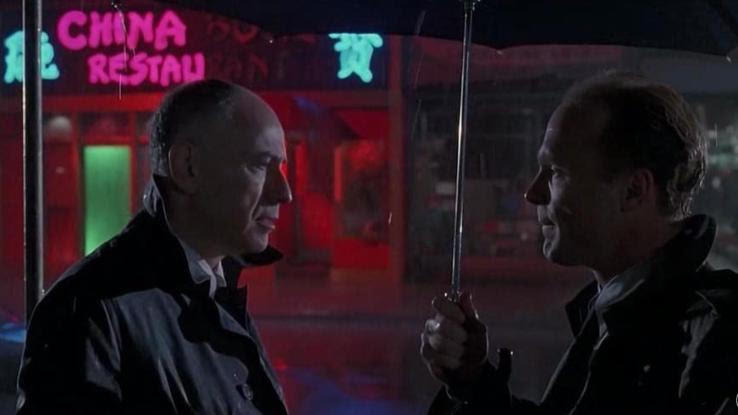
As you might imagine, things get rather intense rather quickly. We don’t want to spoil anything, but just know that the 1992 film adaptation, which features a powerhouse cast — Al Pacino, Jack Lemmon, Alec Baldwin, Ed Harris, and Alan Arkin — is well worth the watch.
Wit (2001)
Written by Margaret Edson, Wit is a one-act play that won the 1999 Pulitzer Prize for Drama. While the play may be slimmer than some of the others on this list, it’s one of the most raw and wrenching. On stage, both Kathleen Chalfant (1997 production) and Cynthia Nixon (2012 production) received acclaim for their portrayals of Dr. Vivian Bearing, and, on film, Emma Thompson earned just as much praise.
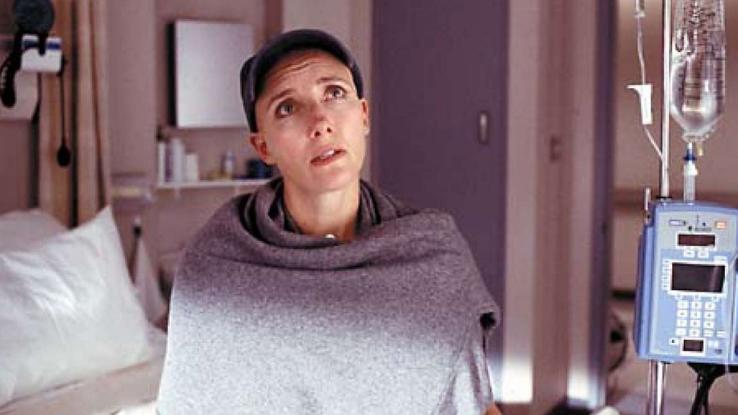
The short play focuses on Vivian’s final hours as she dies of ovarian cancer. The former English professor reflects on her life through the lens of the English language and, most notably, the sonnets of metaphysical poet John Donne. Observant and intelligent, Wit is an emotionally draining experience, but it certainly captures the intensity of live theater.
A Streetcar Named Desire (1951)
Known for iconic works like The Glass Menagerie (1944) and Cat on a Hot Tin Roof (1955), Tennessee Williams is touted as one of the greatest American playwrights of all time. One of his most well-regarded works is the Pulitzer Prize-winning A Streetcar Named Desire (1947). And, undoubtedly, it’s 1951 film adaptation is one of the best stage-to-screen triumphs in motion picture history.
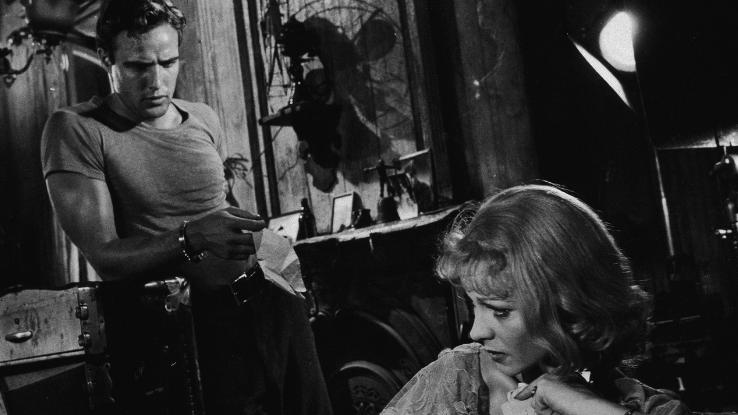
Streetcar centers on Blanche DuBois (Vivien Leigh), a southern belle who leaves her old life behind after a series of personal losses and heads to New Orleans to live with her sister, Stella (Kim Hunter), and brother-in-law, Stanley (Marlon Brando), in a dilapidated apartment building. Winning four of the 12 Academy Awards it was nominated for, Streetcar is so good because it does what other adaptations fail to do.
As New York Times critic Bosley Crowther stated, “inner torments are seldom projected with such sensitivity and clarity on the screen,” but Leigh and Brando manage to capture it all, bringing the raw emotion of the stage to the screen — flawlessly.
Mamma Mia! (2008)
Here we go again, right? Look, 2008 was a standout year for Meryl Streep-helmed stage-to-film adaptations. Not to mention, between Doubt and Mamma Mia!, Streep really underscored her range. As you may know, this jukebox musical-meets-rom-com is based on the 1999 Broadway musical of the same name and filled with songs by pop group ABBA.
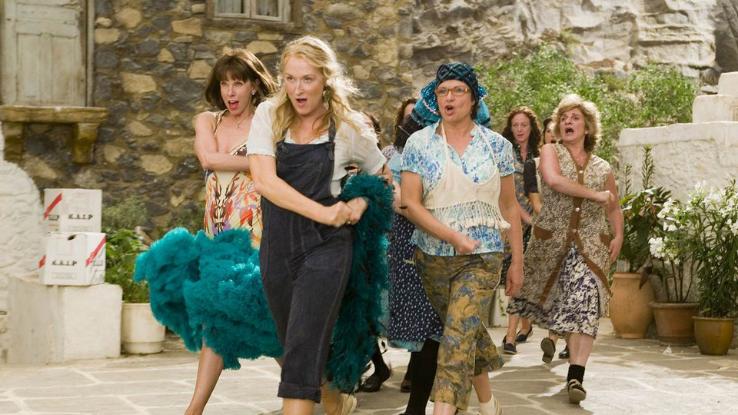
If you don’t already know, the plot revolves around Sophie (Amanda Seyfried) and her mom, Donna (Streep). As Sophie prepares for her wedding, she discovers her mother’s old journal, which details three flings from one pretty exciting summer. The bride-to-be is convinced that one of the three men in Donna’s journal is her father, and invites all three men — Colin Firth, Stellan Skarsgård, and (for better or worse) Pierce Brosnan — to her wedding, without telling her mom. Needless to say, hilarity ensues.
Plus, ABBA has plenty of hits — “Dancing Queen,” “S.O.S.,” “Waterloo,” “The Winner Takes It All,” the titular “Mamma Mia” and many, many more — which makes this musical an absolute barrel of fun. Just try to resist singing along with Donna and her longtime pals (played by Christine Baranski and Julie Walters); spoiler — you won’t be able to, trust us.
West Side Story (1961)
Some films just never go out of style. Such is the case with the 1961 film adaptation of West Side Story, a musical originally written for the stage by Arthur Laurents. Featuring music by Leonard Bernstein and Stephen Sondheim, West Side Story is basically a retelling of Romeo and Juliet, but set in the ’50s.
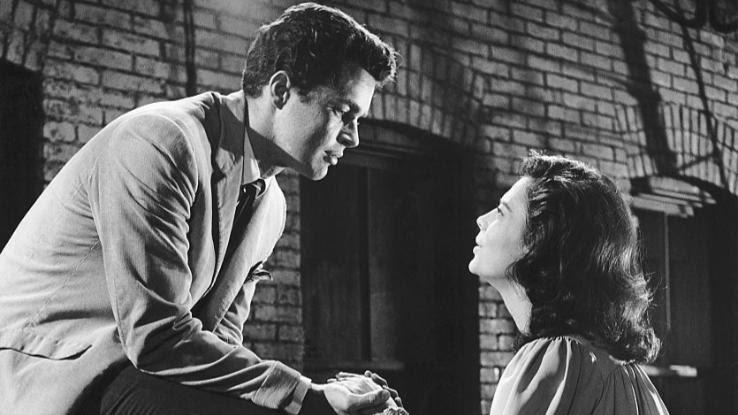
In the film, a New York City gang member named Tony (Richard Beymer) finds himself falling in love with Maria (Natalie Wood). The only problem? The two are aligned with rival Upper West Side gangs — the Jets, the white New Yorkers, and the Sharks, the Puerto Rican New Yorkers. Earning ten Oscars, including Best Picture, West Side Story’s characters, musical numbers and dance sequences are enduring for a reason. Not to mention, it features a breakout performance from EGOT-winning legend Rita Moreno.
Lady Day at Emerson’s Bar and Grill (2016)
Originally, Lady Day at Emerson’s Bar and Grill was staged in Atlanta, Georgia in 1986. But it was the 2014 Broadway revival, directed by Lonny Price and starring Broadway icon Audra McDonald, that left an indelible mark. In the play, McDonald stars as Billie Holiday, who is performing in a run-down bar in Philadelphia. Set in 1959, these performances are meant to be some of Holiday’s last before her death.
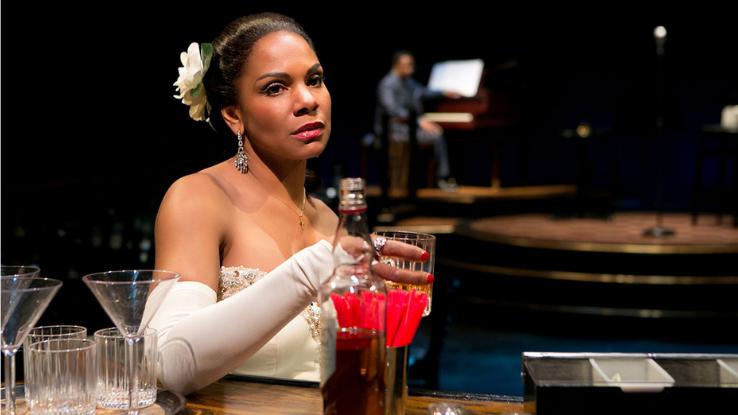
Accompanied by Jimmy Powers (Shelton Becton) on the piano, Holiday recounts stories from her personal life and career. Singing everything from “When a Woman Loves a Man” and “Strange Fruit” to “Easy Livin,'” McDonald gives a powerhouse performance, capturing both the ache and power of Holiday.
The stage version earned McDonald a history-making sixth Tony Award and, in 2016, the HBO broadcast of her performance garnered her an Emmy nomination. Undoubtedly, Lady Day at Emerson’s Bar and Grill proves that more iconic Broadway performances should be preserved on film.






